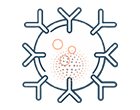Dyskeratosis Congenital Precision Panel
Dyskeratosis Congenita (DKC) is a rare, progressive bone marrow failure syndrome characterized by reticulated skin hyperpigmentation, nail dystrophy and oral leukoplakia. Patients usually present with symptoms of skin hyperpigmentation and nail changes during the first decade of life.





